84 F. average high on July 21.
92 F. high on July 21, 2014.
July 21, 2002: Dew points reached 84 degrees at Madison, Morris, and Olivia. This ties the all- time highest dew points seen by the State Climatology Office for Minnesota.
July 21, 1934: Temperature topped out at 113 at Milan. Source: Twin Cities National Weather Service.

Facts, Data & Rumors
On July 21, 1934 the temperature hit 113F at Milan, Minnesota. People often remark "Paul, it was even hotter back in the 30s. Was that global warming too?" Good question. The reality is that the central USA did experience record heat in the 1930s, coupled with punishing Dust Bowl conditions tied to improper land use, overgrazing and over-farming.
What's different this time around? Warming is global - both hemispheres and the oceans - and there's no apparent astronomical trigger. No, it's not the sun, volcanoes, space aliens or Donald Trump's aftershave.
But then again diving into the data, the facts, the science takes time, effort and perspective. Conspiracy theories, mental shortcuts, are so much easier.
Acknowledging climate change doesn't make you liberal. It makes you literate.
An isolated cauliflower thundershower may sprout this afternoon; I expect more widespread storms Friday when a few could turn severe. Dear Santa: a generator would sure look great under the tree this year.
Much of America is sweltering through the hottest weather of the year. The mercury hits 90F here over the weekend but enough Canadian air will leak south to avoid a nasty case of the Dog Days.
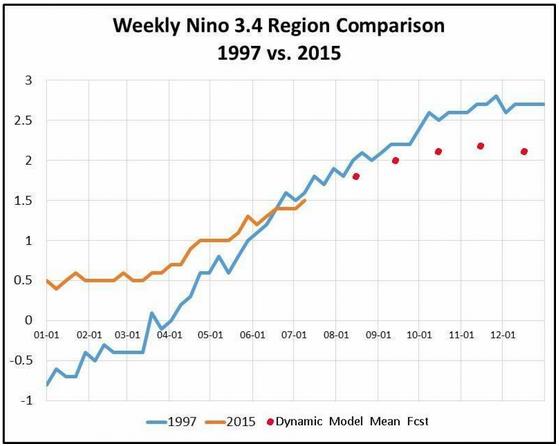
Image credit: Jan Null.
* Bloomberg Business takes a look at the link between an intensifying El Nino and the flurry of hurricanes and typhoons in the Pacific.

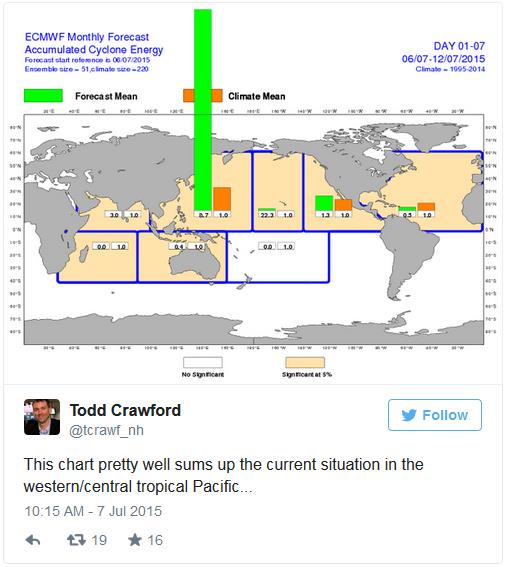
Risk of Record-Setting El Nino With Pacific Cyclones?
A flurry of hurricanes and typhoons, in part related to unusually warm
water, is easing trade winds over the Pacific, causing even warmer water
to come to the surface, setting the stage for what may be the Mother of
El Nino's this upcoming winter. Here is an excerpt from The Weather Network: "...The
current forecast shows at least a 90 per cent chance that El Niño
conditions will last through winter 2015/16 - up to the end of February -
and there is an over 80 per cent chance that it will still be active in
April of next year. Also, it is already forecast to be a significant
event, with sea surface temperatures likely reaching at least 1.5oC (2.7oF) above
normal in the Central Pacific - the same intensity as the 1986/87 El
Niño (which, coincidentally also matches the overall pattern of this
year's El Niño development). However some models are still showing that
it could grow stronger than that, possibly rivaling or even besting the
1997/98 "super" El Niño..."
Graphic credit: Todd Crawford, WSI Energy. "The
Western Pacific Ocean currently has nearly 9 times the normal amount of
accumulated cyclone energy (ACE). The Central Pacific has more than 22
times the normal amount! Since ACE is a measure of the total time and
intensity of storms that have formed in the region during the season,
it's easy to see how much more active it is than normal..."
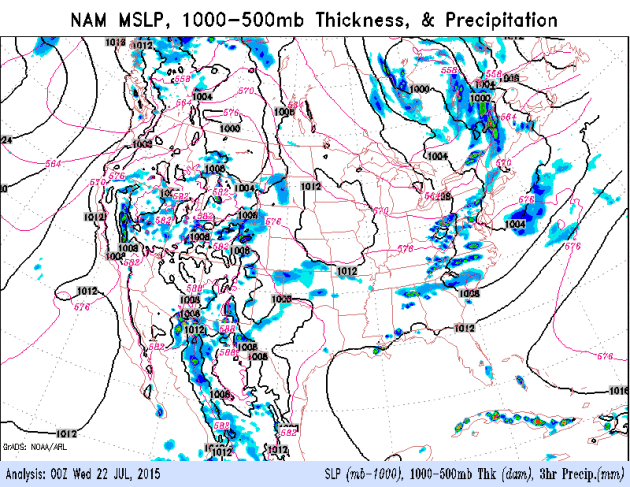
Just a Touch of Dog Days.
NOAA's 84-hour NAM model guidance shows a few isolated T-showers
popping later today, mainly west of MSP. By Friday the risk of T-storms
increases with a better chance of strong, even a few severe storms.
Highs nudge 90F Friday into Sunday with a heat index well into the 90s.
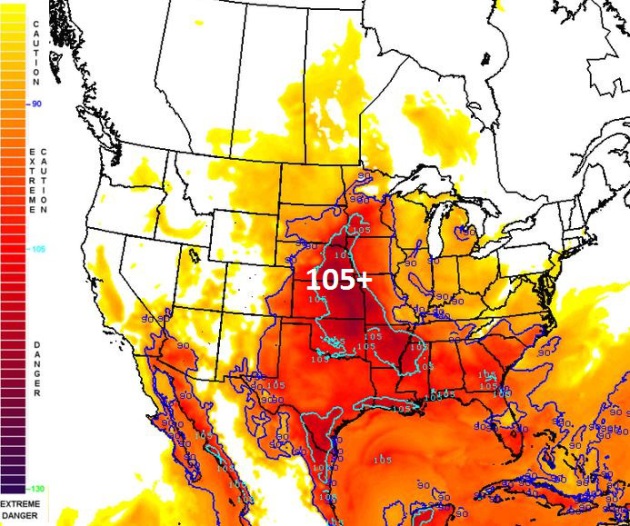
Friday Afternoon Heat Index.
The map above shows the predicted heat index at 4 PM Friday; topping
105F over southwest Minnesota, where NOAA may have to issue Heat
Advisories. Sizzling heat is likely over the central Plains within 48
hours. Source: AerisWeather.
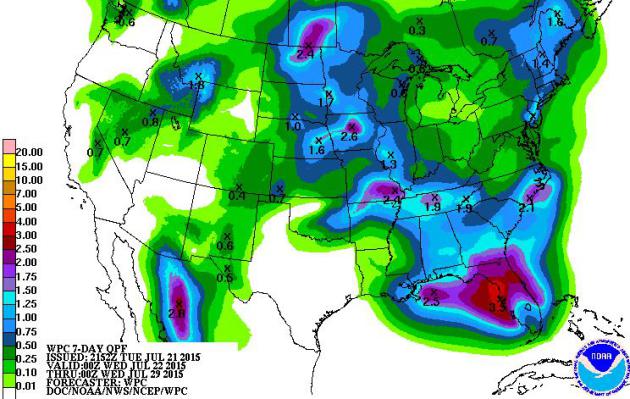
7-Day Rainfall.
NOAA's model ensemble still prints out 3-5" rains over Florida capable
of flash flooding. Much of Minnesota is forecast to see .5" to 1.5" by
Tuesday of next week.
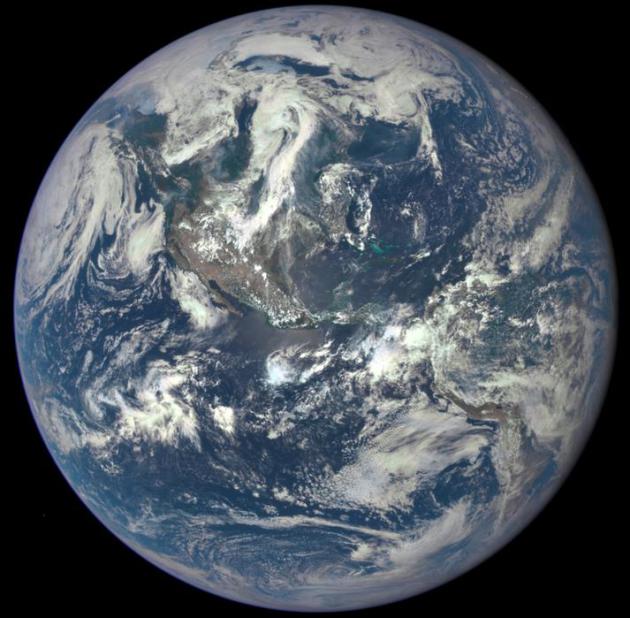
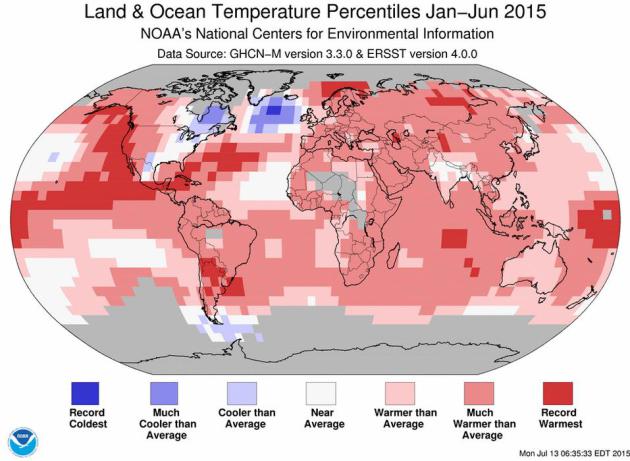
* The full report from NOAA NCDC is here.
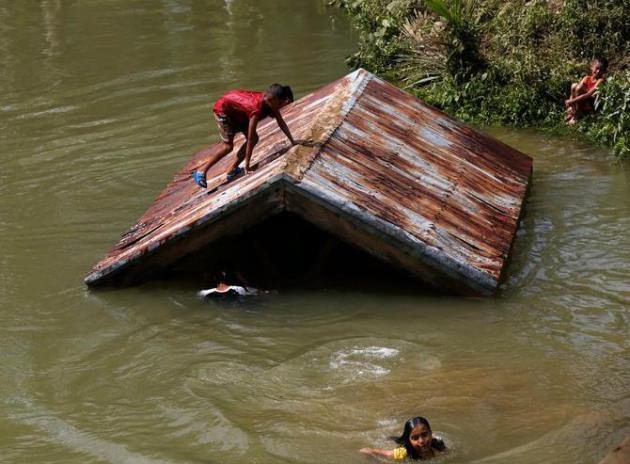
Disasters, Both Natural and Weather-Related Displaced 19 Million in 2014. Here's the intro to a New York Times story: "Natural
disasters forced more than 19 million people from their homes in 2014,
mostly the result of typhoons, flooding and other weather-related events
that are becoming more intense and more frequent, a leading European
aid agency said Monday. Close to 90 percent of the 19.3 million people
displaced by natural disasters last year were in Asia, with China, India and the Philippines particularly hard hit by typhoons, floods, earthquakes and volcanic eruptions, according to a report
released by the Norwegian Refugee Council. The number was lower in 2014
than in the previous two years, but the historical trend in
displacement is moving relentlessly up, the council reported..."
Photo credit above: "Children in the Philippines swam in a flooding river after a typhoon on Samar Island in December 2014." Credit Francis R. Malasig/European Pressphoto Agency.
* The 109 page report (PDF) is here.
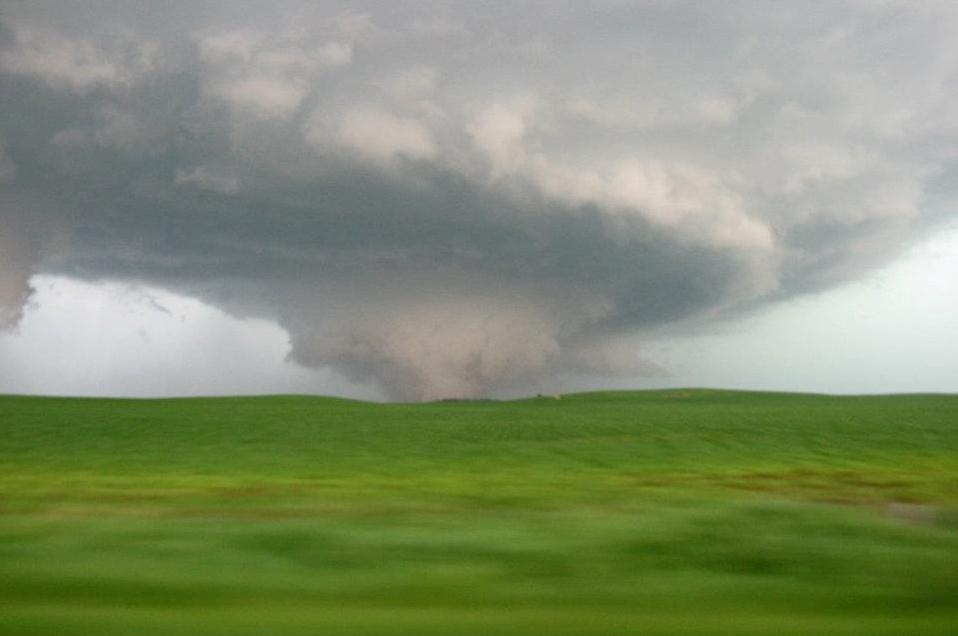
8 Steps Toward Creating a Tornado Preparation and Response Plan. There is some good advice in this article; courtesy of PropertyCasualty360: "...Fact: 75% of people don’t have a complete list of everything in their home, according to a 2012 survey by the National Association of Insurance Commissioners.
Further, homeowners without a home inventory recover on average only
30% of their home’s value if it is destroyed from a natural disaster.
Along with the increase in natural disaster claims in recent years,
insurance fraud has gone up by nearly 45% between 2011 and 2013. Having
third-party documentation of all personal property eliminates the burden
of proof should the unthinkable happen..."
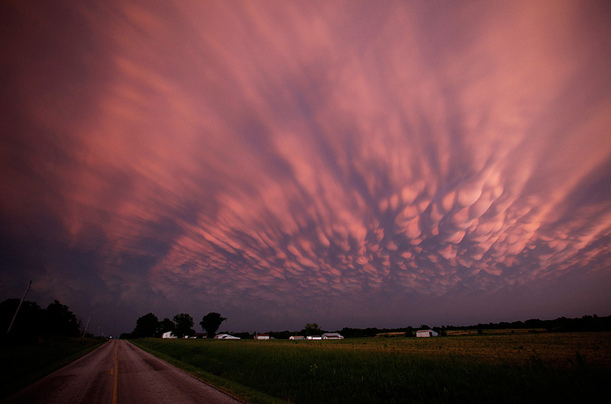
Summer Travel: How To Avoid Extreme Weather, Stay Safe on Vacations.
The most important thing you can do is load the right weather apps on
your smart phone, in my humble opinion. That, and to quote the Boy
Scouts, be prepared. Here's an excerpt from msn.com: "Have
a car charger for cell phones to ensure the ability to call for help if
needed. Smart phones also have access to applications that can give you
weather forecasts or help locate nearby hotels or other shelter if
needed. Brady also suggested the FRX2 American Red Cross radio,
which will carry weather warnings on the radio stations, has a built in
flashlight and can be hand-cranked to give it power or also charge a
cell phone..."

Here's What's Actually Happening To Your Body When You Get a Sunburn. That healthy tan (oxymoron?) may come with a price; here's an excerpt at Huffington Post: "...When
the skin starts detecting UVA radiation, receptors produce special skin
cells called melanocytes which produce extra melanin and darken skin
color. UVB radiation, on the other hand, damages a cell's DNA. If too
many cells are destroyed, it leads to an immune response that looks a
whole lot like a sunburn. While this information may have you rethinking
your beach plans, it's worth noting that sunburns are preventable if
proper precautions are taken..."
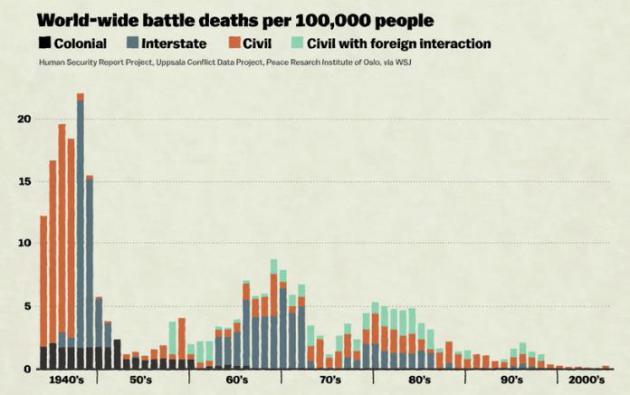
The World Is Getting Better, In 11 Maps and Charts. Vox has an encouraging story. Yes, the glass if half full, maybe more than half. Here's an excerpt: "...The
modern world also birthed horrors — specifically, industrialized
killing in the two world wars. But a wonderful thing has happened since
then: Deaths from war have been in free fall. The percentage of the
global population killed in wars has declined tremendously, owing in
large part to the fact that major nuclear armed powers (like the US and
Russia) have refrained from going to war. War isn't over, obviously, but
we've managed to contain it — safeguarding humanity's gains from
economic growth and scientific innovation..." (Graphic credit: Joe Posner/Vox).

Too Much TV Could Raise The Risk of Alzheimer's, Study Suggests. The Washington Post has more details; here's an excerpt: "...Researchers
at the Northern California Institute for Research and Education in San
Francisco who investigated the association between sedentary lifestyles,
cognitive performance and the risk of developing dementia found that
people who watched a lot of television — namely, four hours or more per
day — scored significantly lower on measures of cognitive performance in
middle age..."

The Smartest Way To Take a Vacation. The Wall Street Journal has some good advice; here's an excerpt: "...Psychologists
and researchers have been studying how to create an ideal vacation that
boosts our well-being, relieves stress that can impact our health, and
helps us recharge for returning to work. Some conclusions: Longer
vacations aren’t necessarily better than shorter ones. Engage in
activities you haven’t done before, even if you’re at home on a
staycation. And end a trip on a high note..."




TODAY: Partly sunny, stray T-shower west. Winds: SW 8. High: 83
WEDNESDAY NIGHT: Isolated evening thunder, then clearing. Low: 66
THURSDAY: Hazy sun, more humid. Dew point: 64. High: 87
FRIDAY: Partly sunny and very humid - risk of a T-storm, possibly strong. Late afternoon heat index near 100F. Dew point: 76. Wake-up: 70. High: near 90
SATURDAY: Hot sun. Winds: NW 5-10. Wake-up: 73. High: near 90
SUNDAY: Sticky sunshine, mostly-dry and hot. Wake-up: 74. High: 91
MONDAY: Deodorant Alert. Still steamy with some sunshine. Wake-up: 73. High: 90
TUESDAY: Heavy showers and T-storms. Wake-up: 71. High: 87
Climate Stories....
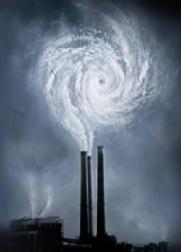
"There are too many special interests - and economic interests easily end up trumping the common good." - Pope Francis, Encyclical Letter Laudato Si.
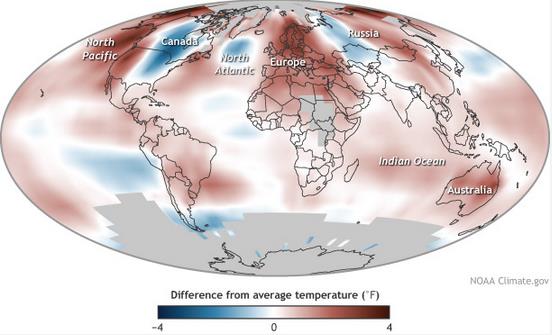
- Greenhouse gases continued to climb: Major greenhouse gas concentrations, including carbon dioxide, methane and nitrous oxide, continued to rise during 2014, once again reaching historic high values. Atmospheric CO2 concentrations increased by 1.9 ppm in 2014, reaching a global average of 397.2 ppm for the year. This compares with a global average of 354.0 in 1990 when this report was first published just 25 years ago.
- Record temperatures observed near the Earth’s surface: Four independent global datasets showed that 2014 was the warmest year on record. The warmth was widespread across land areas. Europe experienced its warmest year on record, with more than 20 countries exceeding their previous records. Africa had above-average temperatures across most of the continent throughout 2014, Australia saw its third warmest year on record, Mexico had its warmest year on record, and Argentina and Uruguay each had their second warmest year on record. Eastern North America was the only major region to experience below-average annual temperatures..."

Image credit above: "Arctic sea ice thickness in autumn as measured by CryoSat-2 between 2010 and 2014." Credit: CPOM.
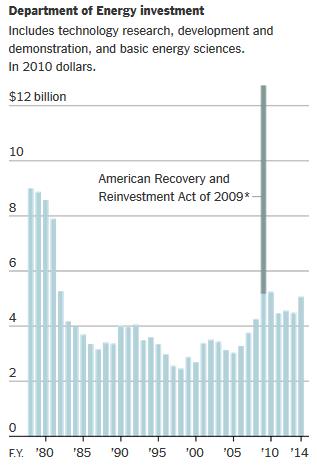
Innovation To Stanch Climate Change Sputters.
Availability of relatively cheap, accessible domestic oil and natural
gas is slowing the adoption rate of renewables, argues the author of a
story at The New York Times; here's an excerpt: "...Perhaps
most critically, the world’s collective effort to reshape energy
infrastructure seems to be losing steam. In 2014, global investments in
renewable energy declined for the fourth year in a row, to under $250
billion. The United States, the most technologically proficient nation
on earth, could be expected to take the lead in developing new energy
alternatives. It isn’t. Awash in cheap energy from shale oil and gas — the product of a surge in federally funded research decades ago — America has lost sight of the goal: decarbonizing the world’s energy supply within a matter of decades..."
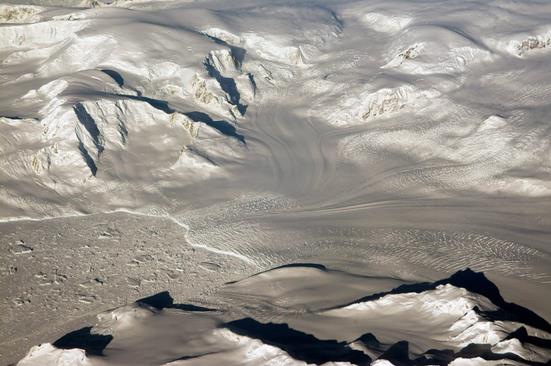
Photo credit above: "A handout photograph provided by NASA shows glaciers and mountains in the evening sun during an Operation IceBridge research flight, returning from West Antarctica, 29 October 2014." EPA/MICHAEL STUDINGER.
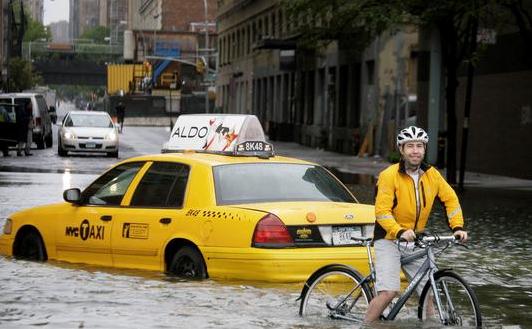
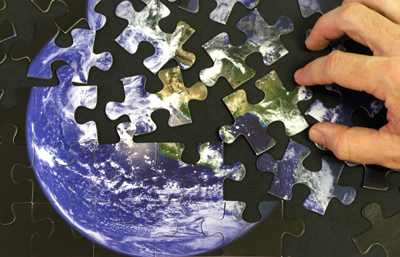

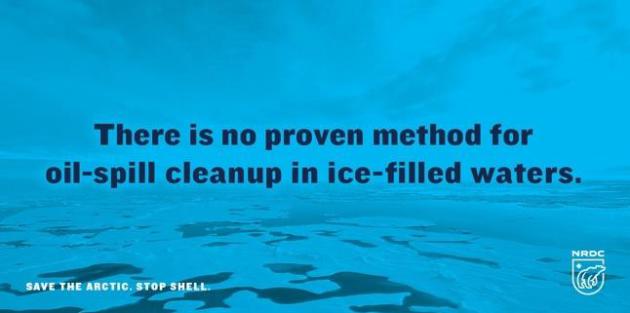
Stop Shell. Save The Arctic. Here's a clip from an Op-Ed at EcoWatch: "...President Obama needs to stand up to Big Oil and put a stop to Arctic drilling before it’s too late. That’s what we’ll be gathering to say during Saturday’s Day of Action,
with events in places across the nation, from Boston to San Francisco,
from Fort Myers, Florida, to Chicago, from Washington DC and elsewhere. As early as next week,
the Royal Dutch Shell oil company could begin exploratory drilling in
the Arctic, exposing these waters to the risk of devastating oil spills
and ensuring more carbon pollution, which would undermine the gains our
country is now making in the fight against climate change..."
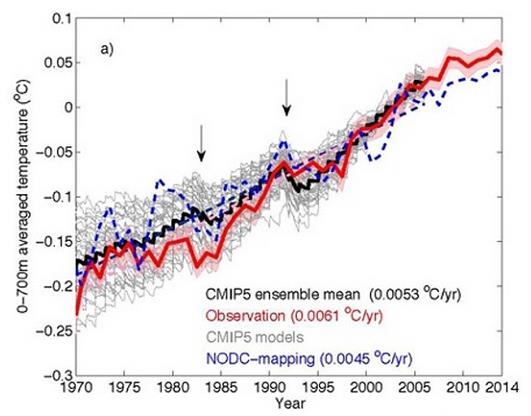
The Oceans Are Warming Faster Than Climate Models Predicted. The Guardian has the article; here's a snippet that got my full attention: "...Going
back to 1970, we find that the upper 700-meter water layer temperature
has increased approximately 0.3°C (approximately 0.55°F). While that may
not sound like a lot, we have to remember this is a huge amount of
water and consequently it requires an enormous amount of energy. We
separated the world’s oceans into the Atlantic, Pacific, and Indian. All
three of these oceans are warming with the Atlantic warming the most.
We also calculated the ocean heating by using 40 state-of-the-art
climate models. Over the period from 1970, the climate models have
under-predicted the warming by 15%..."

Image credit above: "This map shows where flooding could occur in Annapolis in a 100-year flood with a 3.7-foot rise in sea level by 2100." (Courtesy Image, HANDOUT).
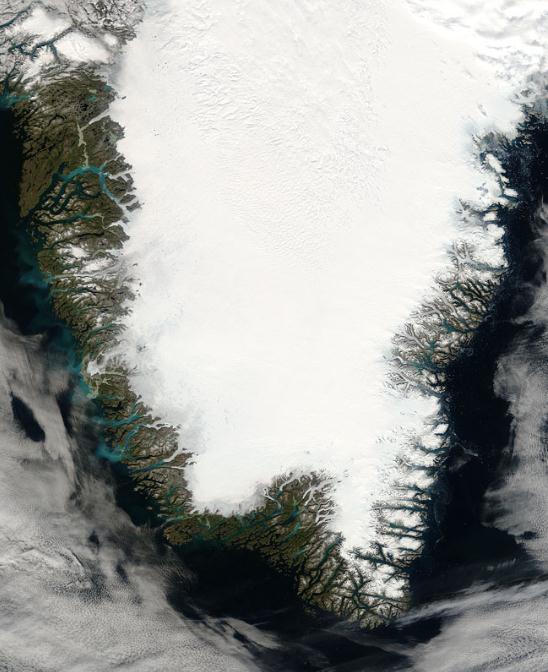

No comments:
Post a Comment